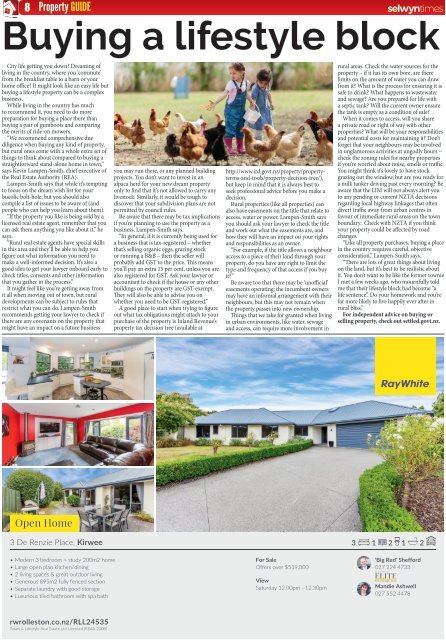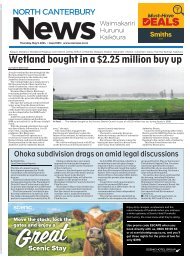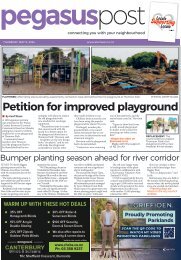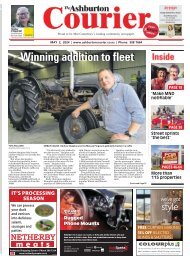Selwyn Times: April 24, 2019
Create successful ePaper yourself
Turn your PDF publications into a flip-book with our unique Google optimized e-Paper software.
2<br />
8<br />
[Edition datE]<br />
Buying a lifestyle block<br />
City life getting you down? Dreaming of<br />
living in the country, where you ‘commute’<br />
from the breakfast table to a barn or your<br />
home office? It might look like an easy life but<br />
buying a lifestyle property can be a complex<br />
business.<br />
While living in the country has much<br />
to recommend it, you need to do more<br />
preparation for buying a place there than<br />
buying a pair of gumboots and comparing<br />
the merits of ride-on mowers.<br />
“We recommend comprehensive due<br />
diligence when buying any kind of property,<br />
but rural ones come with a whole extra set of<br />
things to think about compared to buying a<br />
straightforward stand-alone home in town,”<br />
says Kevin Lampen-Smith, chief executive of<br />
the Real Estate Authority (REA).<br />
Lampen-Smith says that while it’s tempting<br />
to focus on the dream wish list for your<br />
bucolic bolt-hole, but you should also<br />
compile a list of issues to be aware of (and<br />
people who can help you learn about them).<br />
“If the property you like is being sold by a<br />
licensed real estate agent, remember that you<br />
can ask them anything you like about it,” he<br />
says.<br />
“Rural real estate agents have special skills<br />
in this area and they’ll be able to help you<br />
figure out what information you need to<br />
make a well-informed decision. It’s also a<br />
good idea to get your lawyer onboard early to<br />
check titles, consents and other information<br />
that you gather in the process.”<br />
It might feel like you’re getting away from<br />
it all when moving out of town, but rural<br />
developments can be subject to rules that<br />
restrict what you can do. Lampen-Smith<br />
recommends getting your lawyer to check if<br />
there are any covenants on the property that<br />
might have an impact on a future business<br />
you may run there, or any planned building<br />
projects. You don’t want to invest in an<br />
alpaca herd for your new dream property<br />
only to find that it’s not allowed to carry any<br />
livestock. Similarly, it would be tough to<br />
discover that your subdivision plans are not<br />
permitted by council rules.<br />
Be aware that there may be tax implications<br />
if you’re planning to use the property as a<br />
business, Lampen-Smith says.<br />
“In general, if it is currently being used for<br />
a business that is tax-registered – whether<br />
that’s selling organic eggs, grazing stock<br />
or running a B&B – then the seller will<br />
probably add GST to the price. This means<br />
you’ll pay an extra 15 per cent, unless you are<br />
also registered for GST. Ask your lawyer or<br />
accountant to check if the house or any other<br />
buildings on the property are GST-exempt.<br />
They will also be able to advise you on<br />
whether you need to be GST-registered.”<br />
A good place to start when trying to figure<br />
out what tax obligations might attach to your<br />
purchase of the property is Inland Revenue’s<br />
property tax decision tree (available at<br />
http://www.ird.govt.nz/property/propertyterms-and-tools/property-decision-tree/),<br />
but keep in mind that it is always best to<br />
seek professional advice before you make a<br />
decision.<br />
Rural properties (like all properties) can<br />
also have easements on the title that relate to<br />
access, water or power. Lampen-Smith says<br />
you should ask your lawyer to check the title<br />
and work out what the easements are, and<br />
how they will have an impact on your rights<br />
and responsibilities as an owner.<br />
“For example, if the title allows a neighbour<br />
access to a piece of their land through your<br />
property, do you have any right to limit the<br />
type and frequency of that access if you buy<br />
it?”<br />
Be aware too that there may be ‘unofficial’<br />
easements operating; the incumbent owners<br />
may have an informal arrangement with their<br />
neighbours, but this may not remain when<br />
the property passes into new ownership.<br />
Things that we take for granted when living<br />
in urban environments, like water, sewage<br />
and access, can require more involvement in<br />
rural areas. Check the water sources for the<br />
property – if it has its own bore, are there<br />
limits on the amount of water you can draw<br />
from it? What is the process for ensuring it is<br />
safe to drink? What happens to wastewater<br />
and sewage? Are you prepared for life with<br />
a septic tank? Will the current owner ensure<br />
the tank is empty as a condition of sale?<br />
When it comes to access, will you share<br />
a private road or right of way with other<br />
properties? What will be your responsibilities<br />
and potential costs for maintaining it? Don’t<br />
forget that your neighbours may be involved<br />
in unglamorous activities at ungodly hours –<br />
check the zoning rules for nearby properties<br />
if you’re worried about noise, smells or traffic.<br />
You might think it’s lovely to have stock<br />
grazing out the window, but are you ready for<br />
a milk tanker driving past every morning? Be<br />
aware that the LIM will not always alert you<br />
to any pending or current NZTA decisions<br />
regarding local highway linkages that often<br />
divert traffic away from urban centres in<br />
favour of immediate rural areas on the town<br />
boundary. Check with NZTA if you think<br />
your property could be affected by road<br />
changes.<br />
“Like all property purchases, buying a place<br />
in the country requires careful, objective<br />
consideration,” Lampen-Smith says.<br />
“There are lots of great things about living<br />
on the land, but it’s best to be realistic about<br />
it. You don’t want to be like the former townie<br />
I met a few weeks ago, who mournfully told<br />
me that their lifestyle block had become “a<br />
life sentence”. Do your homework and you’re<br />
far more likely to live happily ever after in<br />
rural bliss.”<br />
For independent advice on buying or<br />
selling property, check out settled.govt.nz.


















